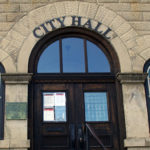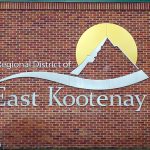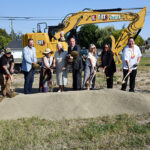Home »

Greg Deck to be first mayor of Jumbo
Jumbo officially a mountain resort municipality
He started the Village of Radium Hot Springs, orchestrating its municipal creation and then guided it as mayor from its 1991 incorporation until he left office in 2008.

And now Greg Deck gets to be mayor of another brand new municipality – Jumbo.
Minister of Community, Sport and Cultural Development Bill Bennett announced today that Cabinet has approved the incorporation of Jumbo as a mountain resort municipality.
A municipal council has been appointed for a term ending Nov. 30, 2014, and an interim corporate officer has also been named and will serve until the first council meeting of the new municipality.
Appointed as Jumbo’s first mayor and councillors are Deck, Nancy Hugunin and Steve Ostrander. Phil Taylor, formerly of the Town of Golden, will be the interim corporate officer, ensuring that the municipality is operational by its incorporation date of Feb. 19, 2013.
According to a government press release, council’s role is to protect the public interest and will include:
* Ensuring that the resort is developed with future residents in mind and that the services and amenities are in place to accommodate them.
* Considering the protection of the environment, and the interest of First Nations.
* Considering the economic development interests of the provincial government and the resort developer.
Selection of council members was based on several suitability factors including local government experience and knowledge of the region. The term of the appointments is from Feb. 19, 2013 to Nov. 30, 2014, and is designed to align with the general local government election cycle. A fully elected council will be put in place at the earliest possible date.
Bennett said he expects once an elected council is put in place that Jumbo would then take a seat at the regional district board table. In the meantime, Deck would be welcome to sit in on RDEK meetings but would not have a vote.
Speaking to media during a press conference in Victoria, Bennett said Deck is the perfect choice to assume command of a new municipality because of his work in Radium Hot Springs.
“Greg brings considerable government experience to the role,” he said.

Bennett said the search for an appropriate lead-in mayor began “about three months ago” and he agrees completely with the government’s choice.
“I’ve been thinking about this, personally, for a long time. He’s taken a brand new community and made a real success of it. He’s trusted and credible and he’s balanced,” said the Kootenay East MLA.
Deck, currently traveling with his family, will be sitting down with e-KNOW for a detailed interview in the near future.
However, he said he believes it’s only fitting that he be willing to take on this role, considering his long-time support for the project.
“This appointment is just a case of having to be ready to work for the things that I believe in. It would be hard, after urging the province for so long to ‘step up’ on this issue not to be ready to do same when asked,” he said.
Deck grew up in the Radium Hot Springs area, and after education and employment in the U.S. and France, returned to the region in 1979.
He also served as the chair of the Regional District of East Kootenay for six years, vice-chair for three years and most recently has been a trustee of the Municipal Finance Authority of B.C. He also continues to sit on the Columbia Basin Trust Board as one of its founding directors.
Under Deck’s guidance, Village of Radium Hot Springs council maintained a strong support for the Jumbo project and voting against the regional government’s desire to maintain legislative control in Jumbo, he led a split board up until his retirement from regional politics in 2008. New chair David Wilks (then Mayor of Sparwood and now Kootenay-Columbia MP), continued where Deck left off and successfully led the charge to overthrow the board’s previous position and the RDEK returned Jumbo to the provincial government to handle local governance.
The regional board’s decision was directly against the wishes of the District of Invermere (DOI), which while Radium supported the project, had traditionally, and still does, oppose Jumbo. Invermere is the gateway to Jumbo and the district has a long history of concerns surrounding the project proposal, stemming back to the mid 1990s.
Anticipating today’s announcement, DOI Mayor Gerry Taft forward the following points to e-KNOW to express his current take on the issue.
The creation of a municipality in Jumbo “does not follow democratic principles that local governments have a population (electorate) and that this population choose their government (council), ignoring these basic principles could have long term negative impacts and set future negative precedents,” he said, adding it, “violates the intent of the condition in the Environmental Assessment Approval that the final decision on land use for Jumbo will be made by local government.”

Taft said he expects Deck and his interim council of two will find their terms stretching past Nov. 30, 2014.
“It is unlikely that there will ever be a permanent population large enough in Jumbo to hold elections and this could remain an appointed council forever,” he said, adding that creates many uncertainties and concerns moving forward.
“It (a non-elected council serving no citizens) does not allow meaningful public process and participation in the land use decisions around rezoning in the Jumbo Valley (ie: potentially no public hearings, or a council which does not have an open mind,” Taft said. “An appointed council that is only accountable to the Province and to the developer, not local people or nearby local governments, does not help foster regional cooperation.”
He noted it is also unclear how changes or amendments to the presented master plan would be dealt with, or how non-construction of the resort or bankruptcy of the resort developer would be dealt with.
“The creation and administration of a municipality with no people will cost the taxpayers of B.C. significant money prior to the time when there might be tax revenue large enough to cover administration costs.”
Bennett’s announcement noted that the provincial government will provide about $200,000 in funding to help the new municipality get off the ground.
“It is a standard practice when you have a new municipality,” he said. “It sets up certain details for the creation of the municipality.” Government won’t be investing in infrastructure, he added.
Bennett said he believes government is spending money wisely in this instance, noting that investing $200,000 to generate “half a billion” in economic activity “is a pretty good investment.”
Taft said the provincial government remains out of touch with the general mind set of provincial municipalities, pointing out that the Union of British Columbia Municipalities (UBCM) board recently passed a resolution asking the provincial government to hold off on establishing a resort municipality until there are at least 200 permanent residents.
The UBCM resolution reads: “THEREFORE BE IT RESOLVED that UBCM ask the Ministry of Community, Sport & Cultural Development to consider a governance structure for mountain resort municipalities that includes elected representatives responsible for land-use decisions for a permanent population of at least 200 people; AND BE IT FURTHER RESOLVED that UBCM does not support the concept of an unelected body making land use decisions for an area with no population.”
Columbia River-Revelstoke MLA Norm Macdonald said today’s announcement is simply the Liberal government ramming its mandate through before the 2013 provincial election.
With only six months left in their mandate, and against the express wishes of the Ktunaxa and local residents, the BC Liberal government has pushed the giveaway of public lands in the Kootenays into high gear, Macdonald stated in a press release.

“I’ve not spoken to anyone outside the BC Liberal party who thinks that this legislation makes sense,” said Macdonald. “To create a town where there are no residents, to appoint a council that may never face election, and do this with no real possibility that a resort will be built is ridiculous. But a small group of Jumbo supporters are getting their way on this one: transferring control of public lands into private hands.”
Macdonald has long been an outspoken critic of the BC Liberals’ pattern of removing decision-making from local residents. The overwhelming view of local residents is that building a resort in the Jumbo Valley does not make economic or environmental sense, his release stated.
“One has to ask why the BC Liberals would press forward with this designation at this time. This resort will never be built, and after more than a decade, the developer has not been able to find an investor. It’s a shocking mismanagement of the powers that have been vested in this government, and is indicative of just how far this government has strayed.
“There is no one who can say this move today is in the public interest. It’s a tremendous abuse of power that voters in this area will reject,” he concluded.
Bennett said Macdonald and the current NDP Official Opposition are playing politics and are hypocrites because the NDP governments of Mike Harcourt and Glen Clark supported the project in its infancy and into the Environmental Assessment phase.
“We have Mike Harcourt on the record… we’ve got Glen Clark on the record, in the Hansard, extolling the virtues of the project. The proponents have responded to every request of government” – from Socred to NDP to the current Liberals, he said.
“I think the NDP are being terribly hypocritical about this,” Bennett said, adding he’s more concerned about the economic well-being of the province and the Columbia Valley than anything else.
“The Columbia Valley has actually been left out of the economic successes (of the region) in the last seven or eight years,” he said, pointing out that Jumbo will create hundreds of construction and road building jobs. “All the good jobs that support families in an area of the province that hasn’t really done well the past few years.
Today’s move by government is the follow-up to the Jumbo Glacier Resort’s Master Development Agreement that was approved in March, following a 20-year review process and extensive consultation that informed and developed the Environmental Assessment Certificate, Resort Master Plan and Master Development Agreement.
The government was asked to take Jumbo back into its bailiwick in 2009, when the Regional District of East Kootenay requested that government incorporate Jumbo as a mountain resort municipality. In May 2012, government amended the Local Government Act to clarify provincial authority to incorporate a mountain resort municipality whether or not there are residents in the area at the time of incorporation.
According to the provincial government, the proposed year-round ski resort will be located at the foot of Jumbo Mountain and Jumbo Glacier, 55 km west of Invermere. The $450-million resort (government’s figure) is planned in three phases and will ultimately include 5,500 bed-units in a 104-hectare resort base area. It is projected to provide approximately 3,750 person years of construction employment and create 750 to 800 permanent full-time jobs.
Joining Deck in establishing the Jumbo municipality
Nancy Hugunin – councillor
Nancy Hugunin, a long-time supporter of the Jumbo project, has been a small-business owner and entrepreneur for 35 years. She is co-owner and operator of a construction company, two restaurants and for the last five years has worked with regional and provincial agencies regarding subdivision consulting and infrastructure approvals. She has been a member, director and president of Windermere Valley Ski Club and serves as Kootenay regional chairperson for the BC Ski Association. Nancy is a mother, a grandmother and has been a Kootenay Valley resident since 1976.
Stephen Ostrander – councillor
Stephen Ostrander has lived in Invermere for most of his life. Graduating from the local David Thompson high school in the early 1970s, he went on to earn a degree in forestry from U.B.C. and then returned to Invermere to work as a professional forester. For the past 30 years, he has been employed locally at all levels of forest planning and management while working at various times for the provincial government and the forest industry. In 2008, Stephen retired from full-time work and since then has been actively involved in a number of volunteer organizations. He is currently a director for the Columbia Valley Food Bank, the Lake Windermere District Lions Club and the Columbia Headwaters Community Forest Initiative. In addition to his volunteer activities, Stephen continues to work part time as a forest management consultant.
Phil Taylor – interim CAO
Interim corporate officer Phil Taylor will work to set up the municipality prior to the incorporation date and council’s inaugural meeting. In addition, he will attend and staff the first council meeting and provide any follow up required.
Taylor is a Chartered Institute of Public Finance and Accountancy qualified accountant with over 32 years experience in the local government sector, including nearly 20 years at the senior strategic management and corporate level. He has worked primarily for smaller communities, most recently for the town of Golden.
Brief timeline of Jumbo’s history, as submitted by the provincial government
* March 1991: Formal Proposal submitted to the province and start of competitive process to identify other potential applications in the same area.
* 1992 – Nov 1994: Review delayed, pending decision under CORE land use process – resulted in a designation for the Jumbo area that supported commercial tourism and resort development use, subject to such development being capable of mitigating potential environmental impacts.
* 1993: Preliminary review under Commercial Alpine Ski Policy.
* March 1993: Interim Agreement signed by the Province – provided sole proponent status and a License of Occupation required to enter onto the land in order to prepare the Master Plan.
* July 1995 – October 2004: Environmental Assessment Act review – EA Certificate granted, with conditions.
* October 2005: Judicial review of the EAO process – the judge upheld the EA Certificate.
* 2006: Review of the draft Resort Master Plan under the All Seasons Resort Policy.
* 2006: Consultation continued under the All Seasons Resort Policy, with commitment to Ktunaxa Nation that a master development agreement would not be concluded with the proponent until consultation was completed.
* July 2007: Resort Master Plan approved by the province.
* 2009: EA Certificate extended for a further five years.
* June 2009: Then-Ministry of Tourism, Culture and the Arts advised the Ktunaxa that the consultation process, as per the agreement between Ktunaxa and the province, was complete. Ktunaxa provided additional information about the area. The province agreed to consider the new information. Consultation continued.
* Nov. 15, 2010: Ktunaxa present their Qat’muk Declaration to the province at the legislature. The declaration says the area is sacred to the Grizzly Bear.
* Summer 2011: Minister of Forests, Lands and Natural Resources Steve Thomson visits the proposed site and meets with the Shuswap, the Ktunaxa and the proponent.
* March 2012: Thomson approves the Master Development Agreement for Jumbo Glacier Resort under the Land Act and the Ministry of Lands, Parks and Housing Act.
* November 2012: Minister of Community, Sport and Cultural Development Bill Bennett announces Letters Patent approved, to incorporate Jumbo as a mountain resort municipality. Bennett also appoints three member municipal council and appoints interim corporate officer.
Please see e-KNOW’s separate story on further project opposition views on today’s announcement, including comments from Ktunaxa Nation, Jumbo Wild and Wildsight
Ian Cobb/e-KNOW







